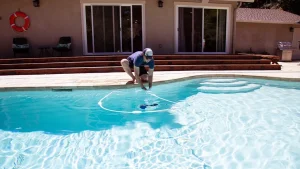Overview of Dichlor Pool Shock
Dichlor pool shock, known for its quick-dissolving characteristics, stands out as a popular choice for pool maintenance. It contains a high level of chlorine, typically around 56-62%, and stabilizers to protect the chlorine from sunlight degradation. This type of shock is ideal for regular maintenance due to its balanced pH levels, which minimize the impact on water chemistry.
Key Features
- High chlorine content for effective sanitation.
- Contains stabilizers for prolonged chlorine effectiveness.
- Balanced pH to maintain water chemistry.
Comparison with Other Types of Pool Shock
Calcium Hypochlorite Shock
Often used for periodic heavy-duty cleaning, calcium hypochlorite shock has a higher chlorine concentration of about 65-75%. However, it requires pre-dissolving to prevent damage to pool surfaces and can significantly increase water pH.
Specifics:
- Chlorine concentration: 65-75%.
- Requires pre-dissolving.
- Increases water pH.
Lithium Hypochlorite Shock
Lithium hypochlorite is a fast-dissolving, low-residue shock, suitable for areas with hard water. However, it comes with a higher cost and a lower chlorine content of around 35%.
Specifics:
- Chlorine content: 35%.
- Ideal for hard water regions.
- Higher cost compared to other shocks.
Non-Chlorine Shock (Potassium Peroxymonosulfate)
Non-chlorine shocks, like potassium peroxymonosulfate, oxidize organic contaminants without increasing chlorine levels. They are perfect for swimmers with chlorine sensitivities and allow pool use shortly after treatment.
Specifics:
- Does not increase chlorine levels.
- Suitable for sensitive skin.
- Allows immediate pool use post-treatment.
Choosing the Right Pool Shock
Factors to Consider
When selecting a pool shock, consider factors like water hardness, budget constraints, and specific pool needs. Dichlor pool shock offers a balanced approach with its stabilized chlorine and neutral pH, making it a versatilechoice for regular pool maintenance.

Budget
- Dichlor is cost-effective for regular use.
- Lithium hypochlorite is more expensive but beneficial for specific water types.
Efficiency and Speed
- Dichlor and lithium hypochlorite shocks dissolve quickly and act fast.
- Calcium hypochlorite requires pre-dissolving but is highly effective for deep cleaning.
Impact on Water Chemistry
- Dichlor maintains a neutral pH balance.
- Calcium hypochlorite can significantly alter pH levels.
Conclusion
Dichlor pool shock presents an effective, balanced, and budget-friendly option for most pool owners. It's crucial to weigh the specifics of each type, like chlorine content, cost, and impact on water chemistry, to ensure the health and longevity of your pool.